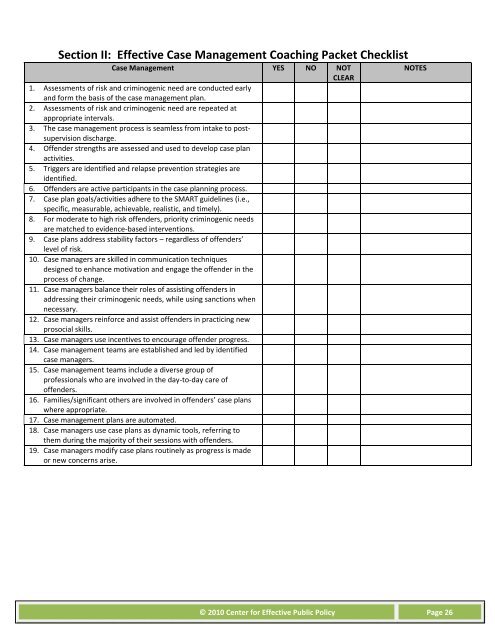COACHING PACKET Effective Case Management - The Center for ...
COACHING PACKET Effective Case Management - The Center for ...
COACHING PACKET Effective Case Management - The Center for ...
You also want an ePaper? Increase the reach of your titles
YUMPU automatically turns print PDFs into web optimized ePapers that Google loves.
Section II: <strong>Effective</strong> <strong>Case</strong> <strong>Management</strong> Coaching Packet Checklist<br />
<strong>Case</strong> <strong>Management</strong> YES NO NOT<br />
CLEAR<br />
1. Assessments of risk and criminogenic need are conducted early<br />
and <strong>for</strong>m the basis of the case management plan.<br />
2. Assessments of risk and criminogenic need are repeated at<br />
appropriate intervals.<br />
3. <strong>The</strong> case management process is seamless from intake to postsupervision<br />
discharge.<br />
4. Offender strengths are assessed and used to develop case plan<br />
activities.<br />
5. Triggers are identified and relapse prevention strategies are<br />
identified.<br />
6. Offenders are active participants in the case planning process.<br />
7. <strong>Case</strong> plan goals/activities adhere to the SMART guidelines (i.e.,<br />
specific, measurable, achievable, realistic, and timely).<br />
8. For moderate to high risk offenders, priority criminogenic needs<br />
are matched to evidence-based interventions.<br />
9. <strong>Case</strong> plans address stability factors – regardless of offenders’<br />
level of risk.<br />
10. <strong>Case</strong> managers are skilled in communication techniques<br />
designed to enhance motivation and engage the offender in the<br />
process of change.<br />
11. <strong>Case</strong> managers balance their roles of assisting offenders in<br />
addressing their criminogenic needs, while using sanctions when<br />
necessary.<br />
12. <strong>Case</strong> managers rein<strong>for</strong>ce and assist offenders in practicing new<br />
prosocial skills.<br />
13. <strong>Case</strong> managers use incentives to encourage offender progress.<br />
14. <strong>Case</strong> management teams are established and led by identified<br />
case managers.<br />
15. <strong>Case</strong> management teams include a diverse group of<br />
professionals who are involved in the day-to-day care of<br />
offenders.<br />
16. Families/significant others are involved in offenders’ case plans<br />
where appropriate.<br />
17. <strong>Case</strong> management plans are automated.<br />
18. <strong>Case</strong> managers use case plans as dynamic tools, referring to<br />
them during the majority of their sessions with offenders.<br />
19. <strong>Case</strong> managers modify case plans routinely as progress is made<br />
or new concerns arise.<br />
NOTES<br />
© 2010 <strong>Center</strong> <strong>for</strong> <strong>Effective</strong> Public Policy Page 26


